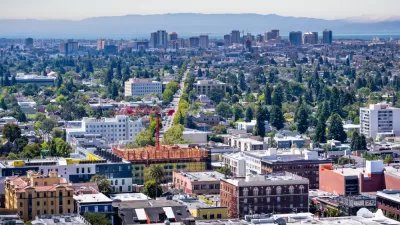A report providing recommendations for Berkeley's Housing Element update recommends allocating affordable housing and exploring a guaranteed basic income program for creative workers.

Berkeley's new Housing Element will include affordable housing and live-work spaces reserved for artists and "cultural workers," reports Berkeleyside's Supriya Yelimeli. A report based on a city survey also recommends consideration for a guaranteed basic income pilot program for people working in the arts.
These recommendations will be among several different priorities in the Housing Element discussion, which include affordable housing for marginalized groups, people who are homeless, families, residents who have been pushed out of Berkeley and the Bay Area, and many others, along with zoning changes to address the city’s legacy of racist housing laws.
The proposal's author, Councilmember Sophie Hahn, says the plan is one way to retain and bring back the creative class that fled Berkeley as housing prices rose. The report also highlighted the importance of safe live-work spaces, particularly in light of the Ghost Ship building fire that killed 36 in Oakland in 2016.
The article continues:
The Planning Commission referral suggests the city find space in commercial, manufacturing, and mixed-use buildings (in both new and existing properties), as well as exploring other possibilities. This would include affordable live-work spaces on the ground floor of some commercial areas, especially those on University Avenue and the San Pablo Avenue corridor in West Berkeley, which is considered the hub of the city’s arts, industrial and creative neighborhood.
The guaranteed basic income proposal would be modeled on similar programs in San Francisco and Minneapolis and, as the article notes, "would prioritize artists who are Black and people of color, and provide them with a monthly, unrestricted stipend to cover rent and food so they can continue their practice."
FULL STORY: Berkeley’s affordable housing talks will include plans to retain artists, ‘cultural workers’

Alabama: Trump Terminates Settlements for Black Communities Harmed By Raw Sewage
Trump deemed the landmark civil rights agreement “illegal DEI and environmental justice policy.”

Study: Maui’s Plan to Convert Vacation Rentals to Long-Term Housing Could Cause Nearly $1 Billion Economic Loss
The plan would reduce visitor accommodation by 25% resulting in 1,900 jobs lost.

Why Should We Subsidize Public Transportation?
Many public transit agencies face financial stress due to rising costs, declining fare revenue, and declining subsidies. Transit advocates must provide a strong business case for increasing public transit funding.

Wind Energy on the Rise Despite Federal Policy Reversal
The Trump administration is revoking federal support for renewable energy, but demand for new projects continues unabated.

Passengers Flock to Caltrain After Electrification
The new electric trains are running faster and more reliably, leading to strong ridership growth on the Bay Area rail system.

Texas Churches Rally Behind ‘Yes in God’s Back Yard’ Legislation
Religious leaders want the state to reduce zoning regulations to streamline leasing church-owned land to housing developers.
Urban Design for Planners 1: Software Tools
This six-course series explores essential urban design concepts using open source software and equips planners with the tools they need to participate fully in the urban design process.
Planning for Universal Design
Learn the tools for implementing Universal Design in planning regulations.
Caltrans
Smith Gee Studio
Institute for Housing and Urban Development Studies (IHS)
City of Grandview
Harvard GSD Executive Education
Toledo-Lucas County Plan Commissions
Salt Lake City
NYU Wagner Graduate School of Public Service





























